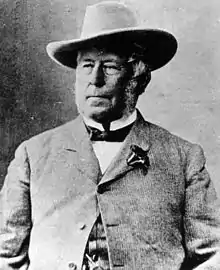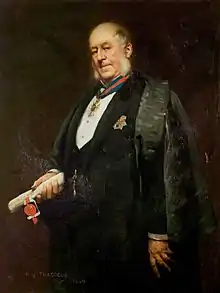Arthur Hodgson
Sir Arthur Hodgson KCMG (29 June 1818 – 24 December 1902) was an Australian pioneer and politician.[1]
- For the Australian rules footballer, see Arthur Hodgson (footballer).
Sir Arthur Hodgson KCMG | |
|---|---|
 | |
| Member of the New South Wales Legislative Assembly for Clarence and Darling Downs | |
| In office 29 January 1858 – 11 April 1859 | |
| Preceded by | Clark Irving |
| Succeeded by | Seat abolished |
| Member of the New South Wales Legislative Assembly for Newcastle | |
| In office 14 June 1859 – 10 November 1860 | |
| Preceded by | New seat |
| Succeeded by | James Hannell |
| Member of the Queensland Legislative Assembly for Warrego | |
| In office 18 September 1868 – 23 November 1869 | |
| Preceded by | Graham Mylne |
| Succeeded by | Thomas McIlwraith |
| Personal details | |
| Born | Arthur Hodgson 29 June 1818 Rickmansworth, Hertfordshire, England |
| Died | 24 December 1902 (aged 84) Clopton House, near Stratford-on-Avon, Warwickshire, England |
| Resting place | Stratford-upon-Avon Cemetery |
| Nationality | English Australian |
| Spouse(s) | Eliza Dowling (m.1842 d.1902) |
| Relations | Edward Hodgson (brother), Sir James Dowling (father-in-law) |
| Alma mater | Corpus Christi College, Cambridge |
| Occupation | Grazier, Squire |
Early life
Hodgson was born in Rickmansworth, Hertfordshire, England; the second son of the Rev. Edward Hodgson and his third wife Charlotte, daughter of Francis William Pemberton of Bombay, India. Hodgson was educated at Eton from 1828–33 and then entered the Royal Navy and was a midshipman from 1833–37 on HMS Canopus on the China station. In 1837–38 he studied at Corpus Christi College, Cambridge.[2]
Australia
In 1839 Hodgson moved to Australia, arriving in Sydney, and soon leased Cashiobury run in the New England district. In July 1840, he sought new land further north in the Moreton Bay district (as it was then known, now called Queensland) based on advice from Patrick Leslie. With a partner, Gilbert Eliott, and his brother, Christopher Pemberton Hodgson, Arthur Hodgson squatted Eton Vale, the second pastoral run on the Darling Downs in September 1840.[3] In the 1846 publication, Reminiscences of Australia with Hints on the Squatters' Life, Hodgson's brother describes the conflict involved in the taking of land ownership from Aboriginal Australians. They named this property Etonvale after Eton College, the illustrious school they both attended in England. The land they marked out was in the possession of the Barunggam people and the book recorded in some detail their "constant skirmishes with the natives" to wrest control of the area, and how "so many hundreds of these poor creatures have been sacrificed". The Hodgson brothers took an active role in the killings. The homestead was decorated with "swords, guns and..all around are displayed spears, boomerangs..dillies and calabashes, the spoil of a hard fought battle or a surprised camp of natives."[4]
In 1842 Arthur Hodgson married the daughter of Sir James Dowling, Chief Justice of New South Wales, which helped advance his position there. In 1856–61 he became general superintendent of the Australian Agricultural Company.[5]
Hodgson represented Clarence and Darling Downs in the New South Wales Legislative Assembly in 1858 and Newcastle in 1859.[6] After the separation of Queensland, he was elected to its Legislative Assembly representing Warrego.[7] Hodgson was minister for public works in the Mackenzie ministry from September to November 1868 and colonial secretary in the Lilley ministry from January to November 1869.[1] He was acting-premier during the visit of the Duke of Edinburgh.[5]

Return to England
In 1870 Hodgson returned to England, settled at Clopton House near Stratford-upon-Avon, of which town he became mayor, and took much interest in the Shakespearian memorials there, and also in the volunteer movement.[5] Hodgson served as High Sheriff of Warwickshire in 1881, as mayor of Stratford from 1883–1888, as well as high steward of the borough from 1884–1889.[1] He represented Queensland at various European exhibitions, and did useful work in helping to develop the Queensland trade in meat and other products.[5] Hodgson was created Companion (CMG) of the Order of St Michael and St George in 1878, and Knight Commander (KCMG) in that Order in 1886 for services in representing Queensland in the exhibitions of Vienna (1873), Paris (1878) and London (1886).
Family
Hodgson married, in 1842, Eliza Dowling, second daughter of Sir James Dowling. They had seven children, including Annie Frances Hodgson,[1] who went on to marry James Wilfred Hewitt, 5th Viscount Lifford.[8] Lady Hodgson died on 2 May 1902, in her 81st year.[9] Hodgson died later that year, at Clopton House on 24 December 1902[1] and was buried with his wife in Stratford-upon-Avon Cemetery.[10]
References
- Waterson, D B (1972). "Hodgson, Sir Arthur (1818–1902)]". Australian Dictionary of Biography. Melbourne University Press. ISSN 1833-7538. Retrieved 20 April 2019 – via National Centre of Biography, Australian National University.
- "Hodgson, Arthur (HG837A)". A Cambridge Alumni Database. University of Cambridge.
- Kingston, Beverley (1972). "Hodgson, Christopher Pemberton (1821–1865)". Australian Dictionary of Biography. National Centre of Biography, Australian National University. Retrieved 19 June 2019.
- Hodgson, Christopher Pemberton. "Reminiscences of Australia". archive.org. Retrieved 23 October 2018.
- Serle, Percival (1949). "Hodgson, Sir Arthur". Dictionary of Australian Biography. Sydney: Angus and Robertson. Retrieved 20 April 2019.
- "Sir Arthur Hodgson (1818-1902)". Former Members of the Parliament of New South Wales. Retrieved 19 April 2019.
- "Former Members". Parliament of Queensland. 2015. Archived from the original on 15 February 2015. Retrieved 15 February 2015.
- Darryl Lundy. "James Wilfrid Hewitt, 5th Viscount Lifford". Archived from the original on 18 February 2015. Retrieved 29 January 2015.
- "Obituary". The Times (36758). London. 3 May 1902. p. 14.
- Cemetery Burials Register Archived 16 June 2015 at the Wayback Machine — Shakespeare Birthplace Trust. Retrieved 15 February 2015.
Further reading
- Hodgson, Arthur, Sir (1844–1926), Arthur Hodgson Archive, 1844-1926 – via State Library of QueenslandCS1 maint: multiple names: authors list (link)
External links
| Wikimedia Commons has media related to Arthur Hodgson. |
| New South Wales Legislative Council | ||
|---|---|---|
| Preceded by John Richardson |
Member for County of Stanley Mar 1854 – Jul 1854 |
Succeeded by John Lang |
| New South Wales Legislative Assembly | ||
| Preceded by Clark Irving |
Member for Clarence and Darling Downs 1858–1859 |
Succeeded by Clark Irving as Member for Clarence |
| New district | Member for Newcastle 1859–1860 |
Succeeded by James Hannell |
| Parliament of Queensland | ||
| Preceded by Graham Mylne |
Member from Warrego 1868–1869 |
Succeeded by Thomas McIlwraith |